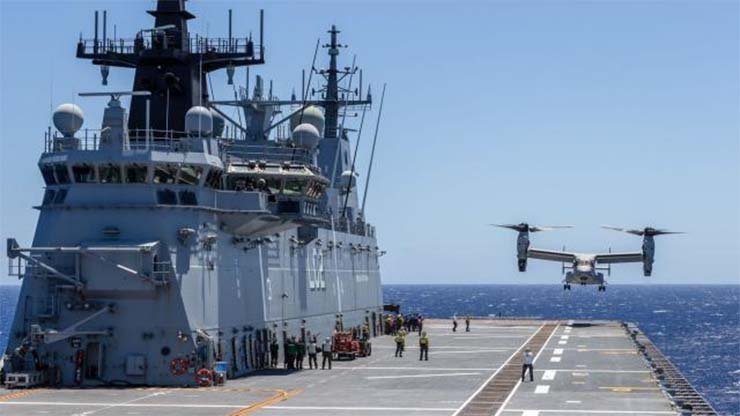
Washington: With the US commercial maritime industry shrinking and the capability of shipyards constructing large, oceangoing military and commercial vessels declining from 30 to six, and their annual output from 60 to seven, according to an analysis of US shipbuilding records, Navy Secretary Carlos Del Toro is raising the alarm, warning that the service won’t be able to fulfil its mission without a strong commercial counterpart.
Del Toro wants to see this commercial maritime might become a reality through an emerging initiative he’s calling “maritime statecraft.” He put forward this idea in a September speech at Harvard University, saying it “encompasses not only naval diplomacy but a national, whole-of-government effort to build comprehensive US and allied maritime power, both commercial and naval.”
In an interview, Del Toro said the decline in commercial maritime capability “has exposed ourselves, as a nation, to shipbuilding, sealift and economic trade vulnerabilities.”
According to 2022 CIA estimates, China has 7,362 merchant ships, or commercial vessels engaged in carrying goods. The United States has 178. If war broke out, the United States could call 60 American merchant ships into service through its Maritime Security Program to supplement about 100 government-owned merchant ships that were mothballed but could return to service. They would help move military vehicles and materiel into a theatre.
But China, which the Pentagon considers the greatest threat to US security, has a far greater ability to compel private companies to support the military, and it has a significantly larger fleet of commercial ships to lean on. Del Toro said the United States can no longer afford this imbalance.
“Maritime statecraft, basically, is a Department of the Navy effort to drive not just our own initiatives but a whole-of-government awareness, advocacy and action to rebuild the comprehensive maritime power of the nation in order to meet the challenges and opportunities we’re going to face as a maritime nation in the 21st century,” the secretary said.
After decades of fewer yards building fewer ships, the American maritime industry requires revitalisation and modernisation, Del Toro explained. To achieve this, he said he’s working with his counterparts across the government to identify what the shipbuilding industry needs and how government can help. He pointed to a tool left unused since the Reagan administration: “construction differential subsidies” to incentivise private companies to buy ships from American builders instead of cheaper foreign yards.
Del Toro, himself a businessman, has been encouraging private investors to spend money on small- and medium-sized shipyards and their suppliers. While nothing concrete has come of these talks, Del Toro said he’s encouraged by the fact investors are “intrigued.” He’s also looking for foreign investment in US small and medium-sized shipyards.
“We’re still fully committed to the Jones Act,” which calls for American-built, owned and operated ships to move goods between American ports, he said. “But having said that, there are opportunities, I believe, as we continue to expand the commercial and naval marketplace — especially the commercial marketplace — for them to invest in some of our shipyards.”
Del Toro said the US needs to be able to push back and help allies and partners deal with geopolitical, economic and climate-related challenges.
To wield greater naval might, Del Toro said the US Coast Guard needs a bigger budget for more ships and operations, particularly in the Pacific. The Navy’s Military Sealift Command and the Transportation Department’s Maritime Administration will also play an increasingly large role in naval diplomacy and maritime statecraft, he added.
Internally, he said, the Navy is focused on closing gaps in its ability to operate and sustain itself overseas. He noted the service wants to increase its ability for Navy oilers to refill their stores from commercial tankers at sea instead of returning to a fuel depot ashore.
Additionally, he expects the Navy to demonstrate its ability to reload vertical launching system cells at sea next year, with a shore-based demonstration in the spring at Port Hueneme, California, followed by an at-sea demonstration in the summer.
Del Toro called these kinds of naval logistics “foundational” to the fleet’s ability to remain at sea in contested waters and conduct missions under the maritime statecraft banner.















